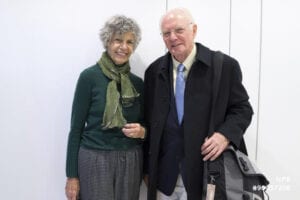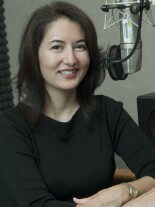May 14, 2021 | By Kurt Loft
National Public Radio
A Trusted Voice Turns 50
. . .

At a time when the First Amendment is under attack, local newspapers are disappearing, and television and the Internet pose propaganda as fact, a trusted voice continues to resonate over our nation’s airwaves.
National Public Radio (NPR) celebrates the 50th anniversary of its first broadcast this month, all the while providing “information of consequence’’ through diverse voices and dialects. NPR has helped redefine not just the content of news, but how stories are told.
“NPR doesn’t just bring news, it also throws open a window to the whole wide world,’’ says Susan Giles Wantuck, longtime announcer at Tampa’s WUSF 89.7 FM and its sister station, WSMR 89.1 and 103.9. “And because it’s radio, there is something very reassuring about it… there’s a thread of storytelling that runs through everything and it brings the voices of all kinds of people.’’
Based in Washington DC, NPR is an independent, nonprofit media organization dedicated to a more informed public. In May 1971, it turned its microphones on as 20,000 people gathered in the nation’s capital to protest the war in Vietnam. What made an impression wasn’t just the words of concerned people on that inaugural All Things Considered broadcast, but the passion of the moment, the subtleties of sound that would become a trademark listening experience.
You can hear NRP’s first All Things Considered broadcast here.
. . .

The team reporting on the protest had no real game plan – just a tape recorder and lots of questions, says Bill Siemering, NPR’s first director of programming.
“I remember, maybe at the first staff meeting, I said ‘we have a blank canvas here, and there’ll be thousands of brush strokes on this,’” he says on NPR’s web site. “But the very first brush strokes that we put on this are very important because that will set a tone and value.’’
It was Siemering who wrote the original mission statement, one that seems foreign to so many of today’s news organizations, particularly television. “(NPR) will regard individual differences with respect and joy rather than derision and hate. It will celebrate the human experience as infinitely varied rather than vacuous and banal. It will encourage a sense of active, constructive participation, rather than apathetic helplessness.’’
WUSF, which broadcasts from the University of South Florida campus in north Tampa, has carried NPR and its various news and feature segments – such as Fresh Air – since the beginning. WUSF is among more than 1,000 NPR stations around the country that depend on the listeners for their generosity, making the network a tight-knit group, says JoAnn Urofsky, WUSF’s general manager.

“The news WUSF reporters bring to the audience and the programs we produce are created to serve the needs of the community, and we are beholden to the community for their support,’’ she says. “The success of NPR and (affiliate) stations has grown over the years due to local support from the stations.’’
Radio has grown considerably since those early NPR days, and its highly visual website now complements the voices delivering news and feature stories. Radio voices back then were mostly men, but at NPR, women ran the show with a cast of luminaries such as Michelle Norris, Cokie Roberts, Nina Totenberg, Linda Werthheimer and Susan Stamberg – NPR’s “founding mother.’’
“We were creating it from scratch,’’ Stamberg notes on NPR’s website. “There was no template for it… When I went on, there were no role models. There were no women doing this.’’
WUSF had its own pioneer in Sheila Stewart, whose dignified British accent and personality won over listeners back in the station’s early years.
“She was the woman who persuaded USF president John Allen to add classical music to the WUSF broadcast schedule,” Urofsky says. “Sheila was the first female announcer for the BBC and no doubt brought the BBC-style craft of announcing to the airwaves of WUSF. Without Sheila, there would likely be no WSMR” (the all-classical sister station).
Classical Music
on WSMR

. . .
You can find WSMR’s 24-hour schedule of classical music at wsmr.org.
WSMR broadcasts on FM radio dial in West Central Florida at 89.1 FM and 103.9 FM, on WUSF HD-2, online at wsmr.org and with a free app for mobile and tablet devices.


